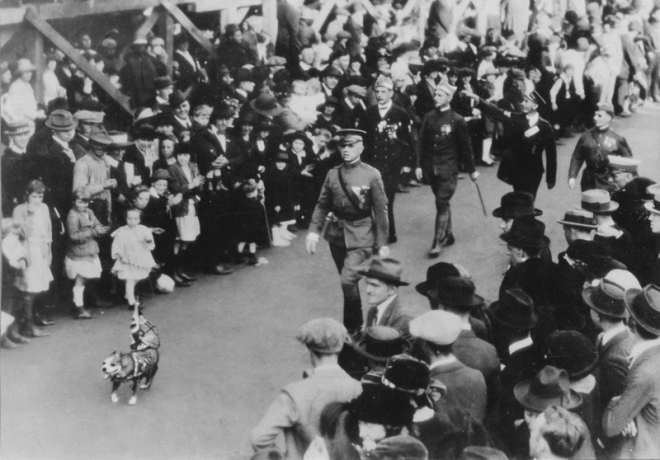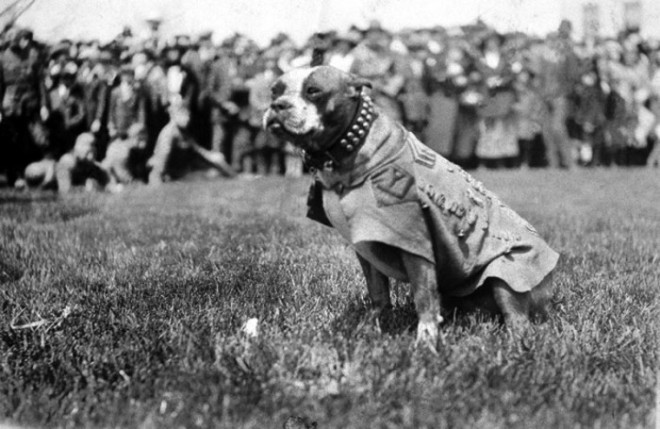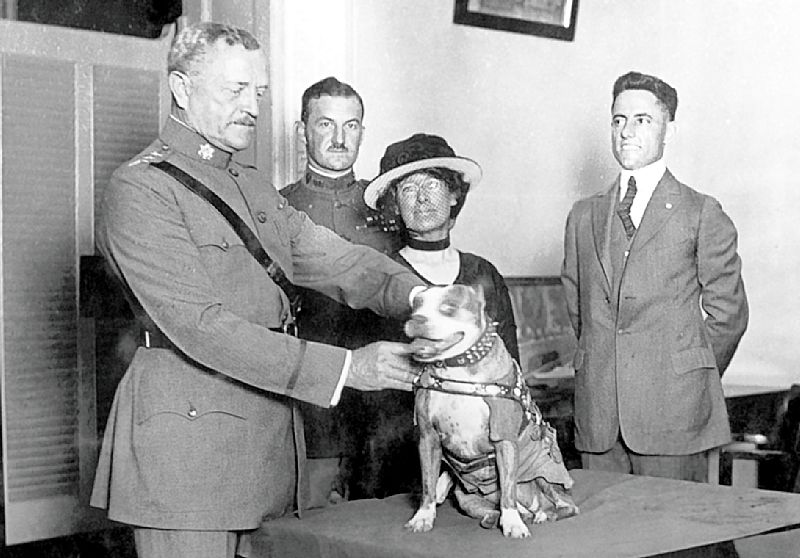His eyes seemed to light up as he watched the group of young soldiers march in unison on that Yale field in New Haven, Connecticut. It was another one of those long days where he’d abandoned his search for food to arrive at the sidelines and witness the orderly procession. He sat there alone, lost in fascination at the sight.
In the previous times he had been here, a few pats and passing smiles had come his way, but mostly his mingling about went unnoticed. Except this day, something happened. As the call to “Fall Out” was shouted, one of the soldiers approached him, smiled and reached down a hand to pet the mutt, a lonely, stray pit bull mix who responded with friendly licks and feisty wagging of his stubby tail. And, in a few minutes, that became the name his friend Corporal Robert Conroy bestowed upon him.
After letting him sleep in the barracks a few times, Stubby became a hit in Conroy’s 102nd Infantry Regiment, 26th (Yankee) Division. The dog’s playful yet obedient manner found him easing the nerves of men preparing to depart for the trenches of France to take part in a distant conflict that everyone in those days called the “Great War.”
Yet, Conroy knew the rules forbade him from taking Stubby along, however, he was so fond of his little friend he couldn’t bear to give him up. After all, as an infantryman, what were his chances of returning alive? Even if he did, would he ever be able to find his dog again? No. In spite of warnings not to do so, he decided Stubby was coming with him, no matter what.

With the tears of family and girlfriends waving goodbye, the 26th departed Newport News, Virginia on the SS Minnesota in October 1917. Safely aboard and out of sight was Stubby, Conroy and his mates seeing to it he remained hidden from officers wandering the ship day and night. They took care of his needs and appeared to be pulling off the charade until a fateful moment occurred. Conroy’s commanding officer discovered the secret.
Displeased and ready to right up infractions, he heard Conroy say “Present Arms!” He watched as Stubby brought a paw to his brow and saluted him. His heart melted. Conroy pleaded his case a little more and the officer finally agreed. They could keep Stubby. In fact, he could be their mascot. He would serve as a brief distraction to temper worries about their destination.
Once in France and marched to the frontline, Stubby settled in nicely, following Conroy about the trenches, and showing little fear for the constant shelling that made the quiet ever more alien. His presence was warming, bringing smiles across otherwise weary faces greeting the dog whenever he patrolled the trenches alone. Here they saw a symbol of kindness in a lethal world that reassured those who stroked his soft head that there still existed a calm peace beyond this Hell. They had no way of knowing that Stubby wanted to be more than just a friend to them. He wanted to be a soldier, like his master. (And boy, as the months unfolded, did he ever become one.)
The misery and stalemate of the trenches shattered when Stubby first followed Conroy across bloody fields on February 5, 1918, to fight in the oft-battled corridor of Chemin des Dames. Under constant fire, he braved the bullets and shells along with the rest of the 26th. He stopped only when they did, and remained eager to go one more time through the fire, which he did with renewed charges for over a month. He jumped over bodies and stayed with the attack, ready to come to the service of a fallen friend. During this time, he learned a vital trade that began saving lives. That whistle. He heard the incoming artillery long before any human ear, and his warning bark sent men scrambling for cover, safe before the rounds impacted.
His bravery became challenged though when shrapnel from a hand grenade wounded him in the leg. He was sent back to an aid station to convalesce, and continued his duty hobbling about, befriending and bringing smiles to critically wounded soldiers. To them, he became another doughboy with whom to share the experience. After his stay, he headed back back up to the front with the division, where he fell victim to a gas attack. It didn’t stop him. He simply adapted. He developed the ability to smell bursting gas before his human comrades, and his barking and nipping at heels alerted them to the dangers. Once he’d seen they were prepared, he’d run and hide to protect himself from the cloud. Then he’d come back out to rejoin the cause, with another awesome ability. A sense of when the Germans were about to go “over the top” and rush the trenches. More nipping and barking prepared his men like no other, and the enemy never succeeded in surprising them.
For all his fearlessness, it was what Stubby did after a battle that displayed his greatest feat of bravery and compassion.
Already have an account? Sign In
Two ways to continue to read this article.
Subscribe
$1.99
every 4 weeks
- Unlimited access to all articles
- Support independent journalism
- Ad-free reading experience
Subscribe Now
Recurring Monthly. Cancel Anytime.
During this time, after an unsuccessful charge, many soldiers still remained in No Man’s Land, the deadliest area between opposing trenches, and a free fire zone for both sides. Men cried out for help, often to no avail. Except this time, a little dog raced amid the shell craters to rest at their side. He led those able to walk back to friendly lines and stayed beside those who couldn’t, barking away, until a medic arrived.
Stubby could become aggressive if he needed to though. One day in September, patrolling an empty trench area, he happened upon a soldier he sensed was out of place. He launched into a run as the man started to flee and clamped down on his leg, toppling him into the mud. Stubby then let go and shut his jaws on a butt cheek, staying locked until a patrol showed up and realized his victim was a German scout wearing an American uniform.
His feat was touted far and wide in the Allied armies. Thereafter, he received a promotion to Sergeant, the only animal to ever do so in the U.S. Armed Forces. Now he outranked his owner. News of this special mutt reached the States, and he was celebrated across the land.

Back in France, Stubby carried on and received his trademark. After entering the town of Chateau-Thierry with his boys, the thankful women made him a chamois coat. Soon it was replaced by one made to look like an army uniform. On it was the Iron Cross taken from the spy, as well as medals awarded from both America and France. By now, the canine was a walking advertisement for valor and achievement.
By the time the war ended in November, and the 26th mustered to go home, Stubby had survived 4 offensives and 17 major battles, including getting lost and shacking up with the French army, making new friends who later returned him to Conroy. He took the dog back home where he was an instant celebrity. He enjoyed a new life leading marches and parades all across the country, making appearances to benefit veterans, and always making himself available to be petted by fascinated children and adults.
Stubby was eventually inducted into the American Legion and, in 1921, General John Pershing, commander of American forces in World War I, personally pinned a specially made hero’s medal on his jacket in the presence of First Lady Florence Harding, the wife of one of three Presidents he met.
After Conroy decided to attend college at Georgetown, he took Stubby along, where he became the college’s mascot. During halftime, he would be brought out to the field to chase the footballs, much to the delight of audiences. It is said he may have been the originator of the halftime show. At any rate, perhaps in tribute, the school’s mascot remains a dog to this day.
In his final years, Sergeant Stubby, despite all the horror he had experienced, never lost that lovable, caring nature that first endeared him to Conroy and the 26th. On a day at home in 1926, the little dog that once upon a time nobody wanted died peacefully in his master’s arms. He left having lived a life few men dared, witnessed history in the making, and rose above it all to become a genuine hero.
All this he packed into in just 10 years on this earth.
(Featured Image Courtesy: Pittsburgh Post-Gazzette)












COMMENTS